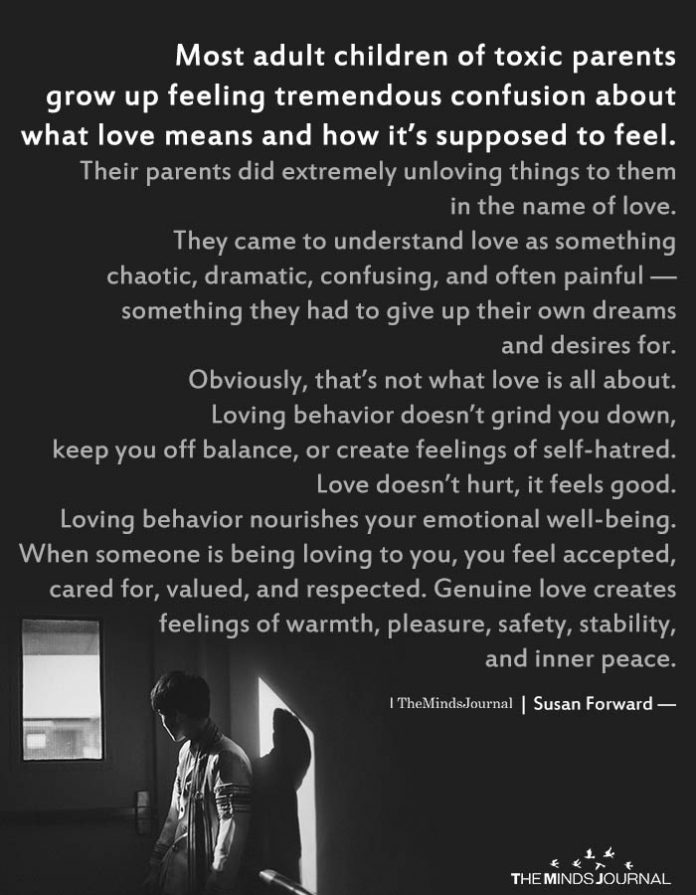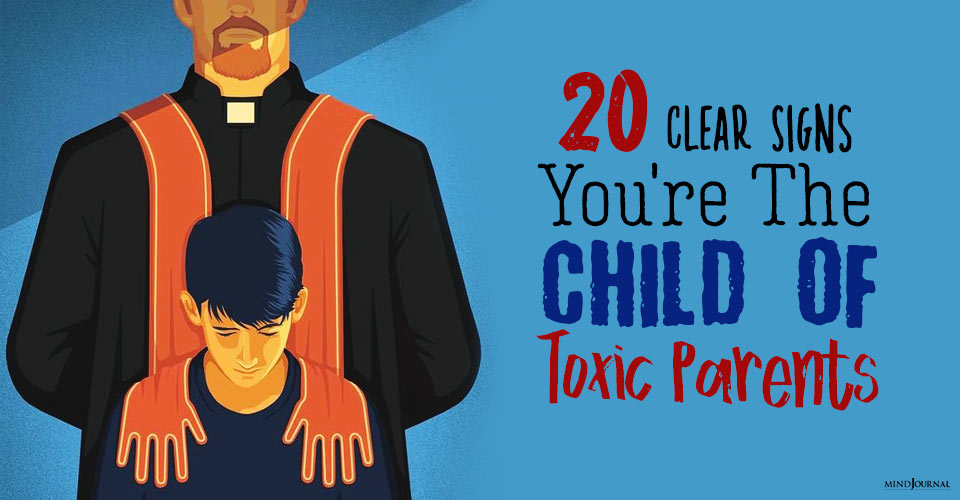Children are often encouraged and taught to explore the hidden and uncharted by their parents who support and love them unconditionally. But is this the truth for everyone out there? Unfortunately, not everyone is blessed with good parents, and children of toxic parents know exactly how that feels.
Toxic parents are often very dominating, abusive, and manipulative and only want their children to dance to their tunes. What their children want, and how they feel do not matter to them in the slightest. They never think about how their actions are affecting their children and their mental health, and only care about satisfying their own egos.
That’s why, it’s no wonder that so many people coming from toxic families carry a lot of trauma, that haunts them even when they step into adulthood.
So, do you have toxic parents? Let’s find out more about it!
20 Clear Signs Of Children Of Toxic Parents

1. Your parents always refuse to respect your boundaries, and are too assertive about their dominance.
2. Children of toxic parents are always made fun of and even belittled about things they are insecure about, like their weight, career, salary, or relationship status. Such parents love making you feel worse about things that are already a source of your anxiety and depression.
Related: 13 Signs Of A Toxic Parent
3. At home, only your parents’ needs and wants mattered, and yours never did. You always came last and were always made to feel like a burden.
4. When your parents are upset, they resort to passive-aggressive behavior and often gave silent treatment to you. If you had siblings, they made sure that they treated them better than you, so that you felt worse and more broken about it.
5. Children of toxic parents are always criticized socially and publicly but are never given any support, compliments, or even encouragement in times of dire need.
6. Growing up in a toxic family, you always struggled and still struggle to show your true emotions, especially the painful ones. If you felt hurt, you used to cry in silence and alone, because you knew nobody would understand, rather you would be made to feel worse about it.
7. Because you had toxic parents, you always had trouble coming to terms with your feelings and emotions in a healthy way. You always doubt your feelings and dismiss your pain as something that’s not at all important.
8. You constantly thought or maybe you still do that your parents would behave differently if you were a lot better, smarter, and successful.
9. Toxic parents can intentionally make a child feel guilty when they do not get what they want, and the same thing happened to you too. Whenever you refuse to do something they blindly want you to do, they play the blame game and try to make you feel bad about it, just because you chose to take a stand for yourself.
10. Children of toxic parents always hesitate to share their achievements and accomplishments with their parents, because they know that they will undermine them, and uselessly criticize everything, just to hurt them and make them feel worthless.
Related: 12 Signs You Have Toxic Parents and How To Deal With It
11. They always want your respect, praise, and attention, but will never give you any.
12. You are forced to do things and participate in activities that only serve their interests. The fact that you never like doing any of it, does not make any difference to them whatsoever.
13. They taught you to be respectful towards them, solely through intimidation, fear, guilt, and threats. You are made to feel that if you did not do what they expect you to, you will be faced with dire consequences.

14. You were gradually molded into a submissive person who was an absolute pushover, or you grew up to be someone who was inappropriately rebellious; someone who was always involved in some kind of trouble or the other.
15. Toxic parents always use money and guilt to manipulate you, which proves to be disastrous for your personality and mindset. You are constantly reminded of how much you “owe” them even for things they did not provide, or things that were their responsibility to provide you.
16. There have been times when your parents made you feel unwanted and a burden on them, by constantly reiterating the opinion that they never wanted you in the first place. That you were an accident, and they wish they would have been childless.
17. They often blame you for any inappropriate reaction and bad behavior, and conveniently ignore the fact that this might be the result of the trauma they inflicted on you when you were a child, and maybe they still do.
Related: Parental Emotional Abuse: The Unseen Scars Left Behind
18. You feel terrified to own up to your mistakes publicly, which shows that you have severe personality problems that need attention and maybe even professional help.
19. Your parents believe that constant negative reinforcement and “tough love” are the only ways to make sure that you grow up to be a strong and successful person, and not love, encouragement and affirmation.
20. You always feel scared and apprehensive about trying out new things, and listen to your heart, because you are convinced you will fail. This is because you were always made to feel inadequate and not good enough by your parents.
If you notice even half of these characteristics in your parents, then be rest assured that you have toxic parents. Don’t let their negativity and toxicity get to you, and have faith in yourself and your abilities. Be kind to yourself, and treat yourself with love and compassion, because you deserve it.
Frequently Asked Questions (FAQs)
How do you deal living with toxic parents as an adult?
If you have toxic parents and you are finding it increasingly hard to deal with them, then you can take these steps – set boundaries, try not to have emotional reactions to their words and actions, minimize contact with them as much as possible and seek professional help if needed.
What are signs that a person was raised by abusive parents?
Some of the prominent signs that a person was raised by abusive parents are physical abuse, emotional abuse, humiliation in front of others, excessive criticism, blaming, scapegoating, gaslighting, calling them names, and ridiculing and mocking them all the time.
How can I help my child with toxic parents?
If your child has toxic parents, then you can help them by encouraging them to practice self-compassion, setting boundaries, validating their emotions and pain, emotionally supporting them, and always trying your best to be there for them, whenever things get bad.
How to deal with toxic parents spiritually?
If you want to deal with your toxic parents spiritually, then here are a few things you can do to achieve that – stop looking for their validation, let go of the expectation that they will change, set strict boundaries, have an exit strategy at all times, and don’t share your personal matters with them.
Is it possible to get away from toxic parents as an adult?
Yes, it is possible to get away from toxic parents as an adult. If they show no signs of changing, and they keep on making your life miserable, then you should probably cut the cord. It might be difficult in the beginning, since they’re your parents, but you really need to prioritize your mental and emotional health.


















Leave a Reply